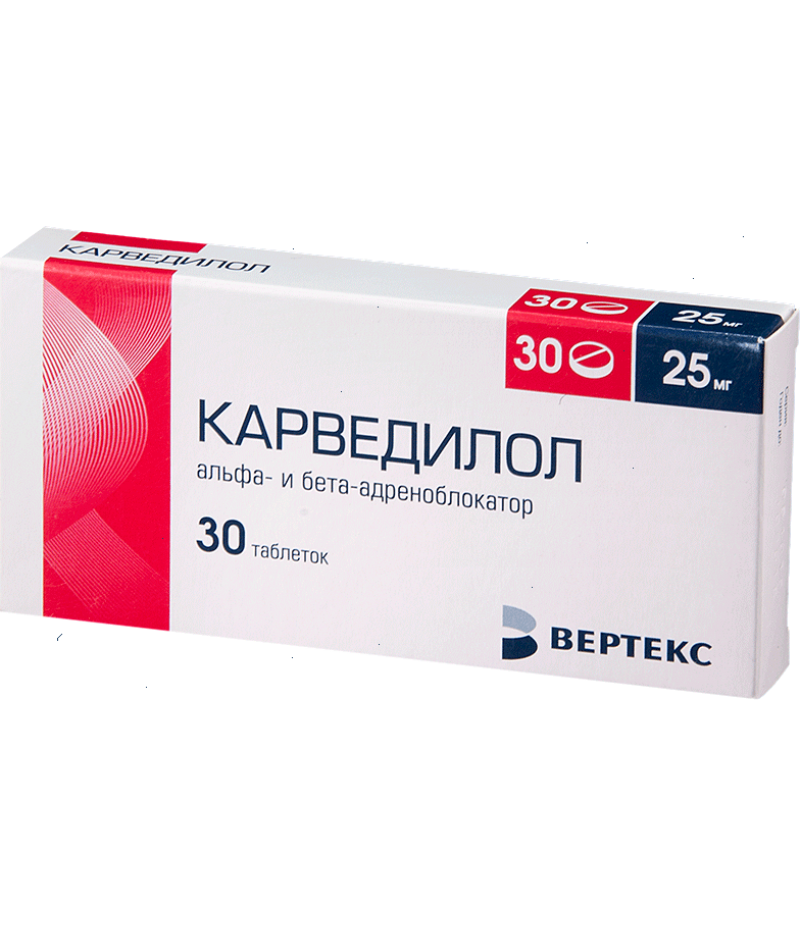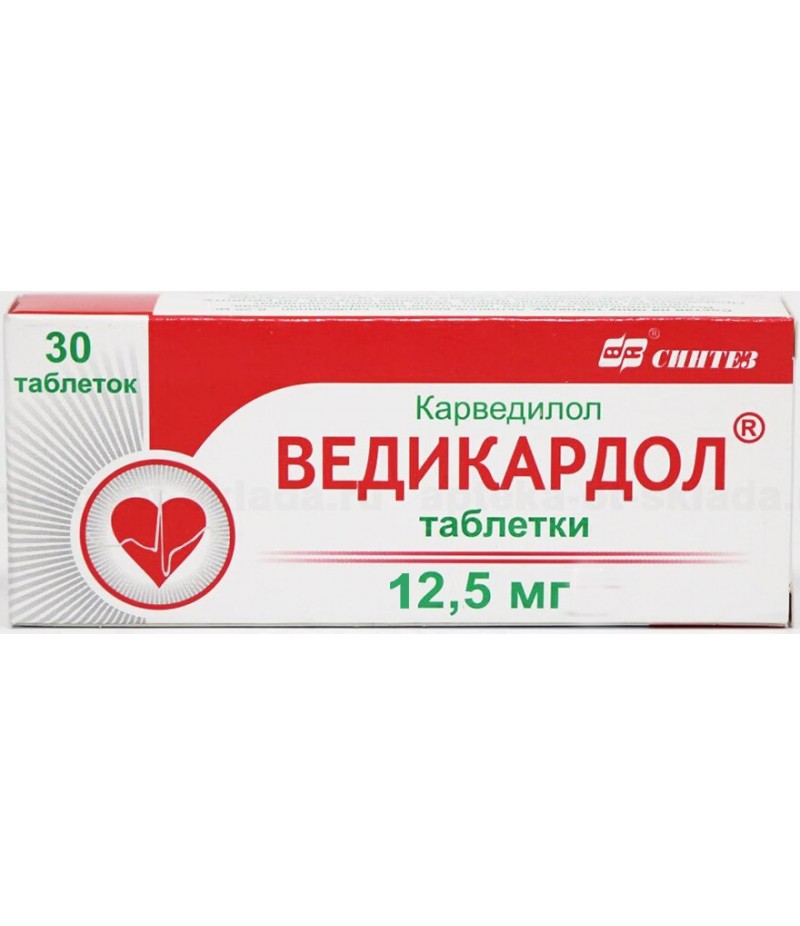Carvedilol tabs 25mg #30
- $12.60
- 3 or more $12.40
- Availability:In Stock
Instruction for CarvedilolReed more and buy Carvedilol tablets on this pageCompositionThe composition of this drug includes carvedilol, which is an active substance, as well as a number of excipients: milk sugar;..
Tags: tabs
Instruction for Carvedilol
Reed more and buy Carvedilol tablets on this page
Composition
The composition of this drug includes carvedilol, which is an active substance, as well as a number of excipients:
milk sugar;
sucrose;
methyl cellulose;
polyvidon K25;
croscarmellose sodium;
crospovidone.
Form of issue
Tablets with an active substance content of 12.5 and 25 mg in a contiguous cell pack of 10 pcs., In a carton pack of 3 packs.
pharmachologic effect
Carvedilol is a non-selective beta-blocker with alpha-1 blocking activity and is indicated for the treatment of hypertension as well as mild to moderate heart failure of ischemic origin.
Pharmacodynamics and Pharmacokinetics
The mechanism of action Carvedilol is a racemic mixture in which the non-selective beta-adrenoceptor blocking activity of S (+) - enantiomer and alpha-adrenergic receptor blocking activity of R (+) and S (-) enantiomers with equal efficiency. Carvedilol also reduces systemic vascular resistance by blocking alpha-adrenergic receptors.
The active ingredient of the drug and its metabolite BM-910228 (less potent beta-blocker, but stronger antioxidant) restores the inotropic response to Ca 2+ OH - free radicals in the myocardium and also reduces the content of active radicals induced in sarcoplasmic reticulum Ca 2 + -ATPase. Thus, carvedilol and its metabolites can be useful in chronic heart failure and to prevent damage to free radicals.
Carvedilol is rapidly and intensively absorbed after oral administration with a bioavailability of about 25% to 35%. Bioavailability of the active substance is not affected by food intake, but can slow its absorption. Binding to plasma proteins is almost absolute 98-99%. Clearance - from 6 to 10 hours. The drug is excreted from the body mainly with bile.
Indications for use
This drug is prescribed for the treatment of mild or moderate heart failure of ischemic or cardiomyopathic origin. In addition, carvedilol is prescribed for arterial hypertension as a monotherapy or combination therapy and for angina pectoris.
Contraindications
Carvedilol is contraindicated in patients with:
bronchial asthma (there were 2 cases of death from asthmatic status in patients) or related bronchospastic symptoms of the second or third degree;
syndrome of weakness of the sinus node or pronounced bradycardia (if the permanent pacemaker in place);
cardiogenic shock or decompensated heart failure requiring intravenous infusion;
clinically evident hepatic insufficiency;
hypersensitivity to any of the components of the drug.
Side effects
Patients taking this medication may experience dizziness, headaches and even fainting.
The most common side effects with carvedilol are:
hyperglycemia or high blood sugar;
excessive thirst;
frequent urination;
a feeling of severe hunger;
weakness;
blurred vision.
If patients who take this medication feel any of these symptoms, they should consult their physician as soon as possible.
Side effects observed in rare cases:
nausea;
vomiting;
diarrhea;
joint pain;
insomnia;
cough;
dry eyes;
deterioration of vision;
numbness or tingling in the limbs;
weight gain;
chest pain;
swelling of the hands and feet;
rash;
hives;
itching.
Carvedilol, Instructions for Use (Method and Dosage)
Instructions for use Carvedilol: the drug is taken with a large amount of liquid and preferably after eating. Dosage and duration of drug intake is selected individually, depending on the severity of the patient's condition.
With hypertension, the drug is used for 1 to 2 weeks at a dosage of 12.5 mg per day. Preferably take the drug after a hearty breakfast. At the discretion of the attending physician, the daily dose can be divided into two equal parts-6.25 mg. After the dosage is increased to 25 mg per day.
With angina, the drug is given in a dosage of 25 mg per day. Dosage is divided into 2 divided doses in equal proportions. After a week of applying the drug, the daily dose can be increased to 50 mg at the discretion of the treating doctor.
Overdose
Overdose of carvedilol may result in the following symptoms:
marked decrease in blood pressure;
arrhythmia with low heart rate;
violation of respiratory function;
heart failure;
left ventricular failure of an extreme degree;
heart failure.
At the first manifestations of symptoms of overdose, it is necessary to immediately seek qualified help. To get rid of symptoms of an overdose it is possible by washing the stomach and prescribing adrenoreceptor agonists.
Interaction with other drugs
Acetohexamide, Insulin - Carvedilol can reduce symptoms of hypoglycemia;
Citalopram - with simultaneous admission with this drug, bradycardia can manifest;
Clofelin is a manifestation of hypertension;
Ciclosporin - Carvedilol may enhance the therapeutic and side effects of Cyclosporine;
Digoxin - the effect of digoxin with simultaneous reception with the described drug is enhanced;
Dihydroergotamine, Ergotamine - ischemia with a risk of gangrene;
Adrenaline - development of hypertension and bradycardia;
Etravirin - when using both Carvedilol and Etravirine (an inhibitor of CYP2C9), an increase in the concentration of the active substance in the serum can be observed;
Gliklazid, Glipizid - can reduce the symptoms of hypoglycemia;
- risk of inhibition of renal prostaglandins;
Indomethacin, Ibuprofen - risk of inhibition of renal prostaglandins;
Lidocaine - may increase the effect and toxicity of lidocaine;
Piroxicam - risk of inhibition of renal prostaglandins;
Prazosin - the risk of developing hypotension at the beginning of therapy;
Verapamil - an increase in the effect of both drugs.
Terms of sale
You can buy Carvedilol without a doctor's prescription.
Storage conditions
Keep this drug at a temperature not higher than 25 C and not below 15 C Celsius. Preferably choose a dark storage place with a moderate level of humidity.
Shelf life of the drug is 3 years.
Reviews about Carvedilol
Reviews about Carvedilol on the forums can not be called unanimous, but still most of them are positive.
Review of one of the Internet users:
"My mother suffered 2 heart attacks, which is why she is regularly in the cardiology department of the local hospital. Recently, her doctor appointed receiving carvedilol drug initially for 2 weeks on half a tablet (12.5 mg), and then 1 tablet (25 mg) per day. After the indicated period of taking the medicine, the mother noticeably improved her health. At least, heart attacks did not happen. Positive dynamics satisfied the attending physician, but he recommended to continue taking the drug, but gradually reduce the dose. I hope that everything will be all right now. "


